Whop is the best community app - but it's not the only one. Read our comprehensive guide to 10 of the best community platforms.
Key takeaways
- All-in-one platforms like Whop offer the lowest barrier to entry with no monthly fees, just transaction-based pricing.
- Video-focused or enterprise platforms cost significantly more but provide specialized features like branded mobile apps.
- Free platforms like Discord work for engagement but require third-party tools like Whop to monetize your community.
If you want a community app that actually helps your business make money, start with Whop.
It’s built for creators and business owners who want to turn engagement into income, with tools for selling, chatting, and managing your members all in one place.
Still, there are plenty of other strong contenders out there. Here’s a breakdown of the 10 best community apps to help you find the one that fits your goals.
Top 10 community apps of 2026
These 10 picks cover everything from free hangouts to paid membership hubs.
We’ll break down the pros, cons, and who each one works best for so you can jump in without the stress.
1. Whop: The GOAT of community apps
We built Whop for creators and businesses who want control over their community and monetization.
Run your community your way, and sell digital products, host events, run courses, or set up subscriptions, all from one platform. No juggling multiple apps, no hidden charges.
The Whop App Store lets you add the features you need in seconds. Chat, forums, video calls, giveaways, courses: pick what works for your community, and your members get instant access. You can update your setup anytime, adding or removing features as your needs evolve.
And payments are simple with Whop Payments. Domestic cards are processed at 2.7% + $0.30 per transaction, with extra fees only for international cards or currency conversion. Optional services like orchestration, billing, or tax remittance add small fees if enabled.
Oh, and automation, member onboarding, and analytics are built in – so you can focus on growing your community instead of wrestling with tech.
- Features: Fully customizable communities via the App Store, digital products and memberships, events, forums, chat, and automation for onboarding. Smooth integration with other tools.
- Pricing: Payment processing fees of 2.7% + $0.30 per domestic transaction; optional international/currency fees. No monthly subscriptions.
- Pros: Flexible, all-in-one platform, multiple ways to monetize, easy to manage.
- Cons: Smaller footprint compared to legacy platforms, but rapidly growing.
- Best suited for: Creators and digital entrepreneurs who want maximum control over their community and monetization options.
2. Uscreen

Uscreen is a platform built mainly for video creators. It’s designed to help you launch streaming content, with community engagement centered around videos—think commenting, downloads, and watch activity.
A standout feature is the ability to create branded mobile apps, which is handy if you want your videos to reach audiences across different devices. Uscreen also supports monetization and subscription tiers, letting you give members different levels of access to your content.
- Features: Video-first platform, branded mobile apps, multiple monetization options.
- Pricing: Starting at ~$149/month + ~$1.99 per paid member/month (for basic usage); costs increase as members grow.
- Pros: Strong video tools, encourages member interaction, supports app creation.
- Cons: Focused on video content only, can get expensive.
- Most suitable for: Experienced video creators looking to grow a monetized community.
What is Uscreen? An In-Depth Review of the Video Monetization Platform
3. Mighty Networks
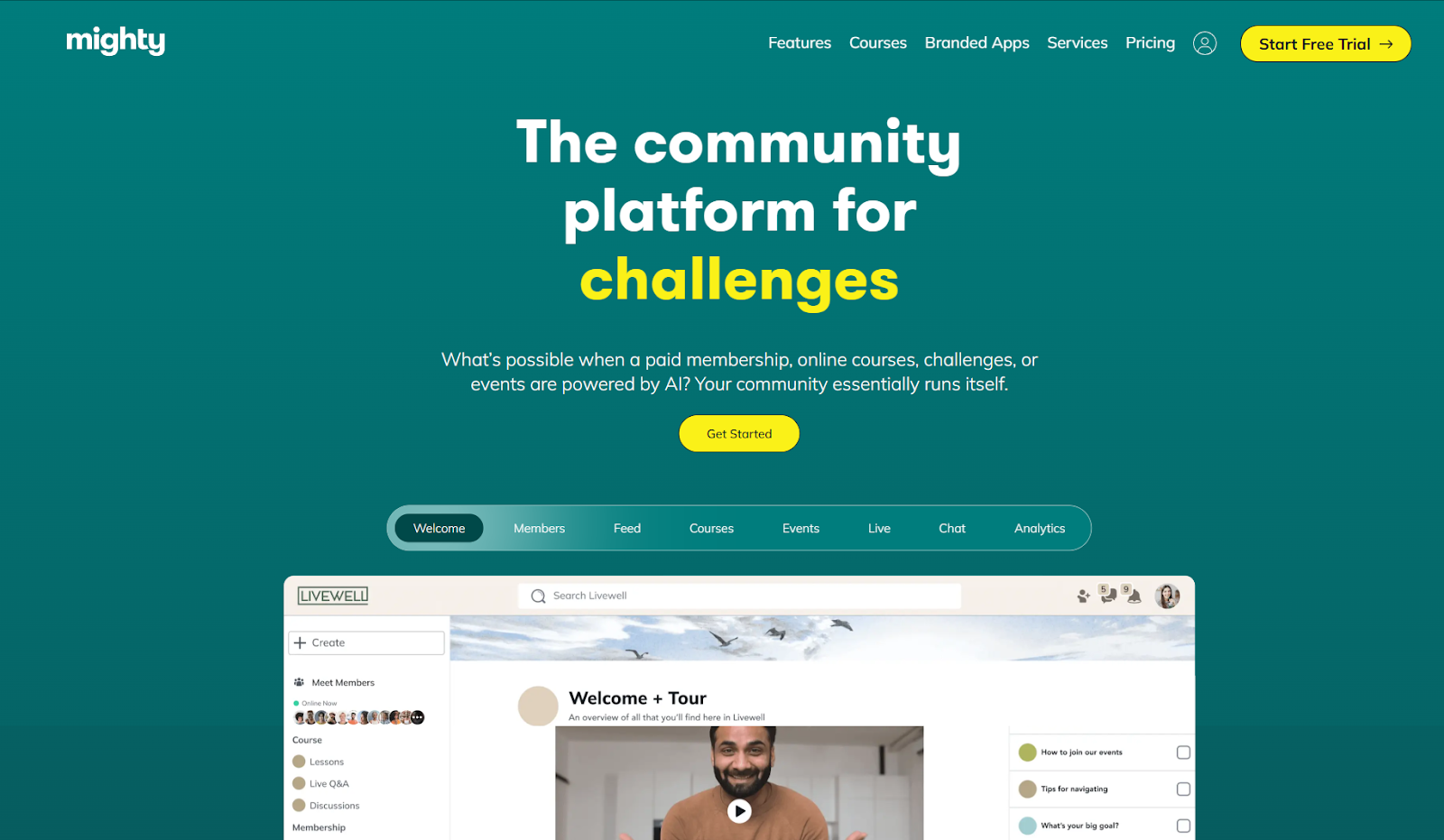
Mighty Networks is a community platform built for creators and entrepreneurs who want to host, engage, and monetize in one place. Its activity feed keeps members updated, while events and chat options encourage interaction. AI tools help generate names, descriptions, and themes, though you can fully customize them.
- Features: Activity feed, events, chat, AI-assisted setup, course creation, and monetization tools.
- Pricing: Starts around $49/month (when billed annually) for the Community plan; higher tiers add branded apps, advanced analytics—and transaction/feature fees may apply.
- Pros: All-in-one platform, AI tools help with setup and keep communities engaged.
- Cons: Some features limited to higher-tier plans; can get expensive for advanced functionality.
- Most suitable for: Beginner to mid-level creators who want a straightforward community setup with engagement tools.
Mighty Networks: Is It the Best Choice for Your Community?
4. Thinkific
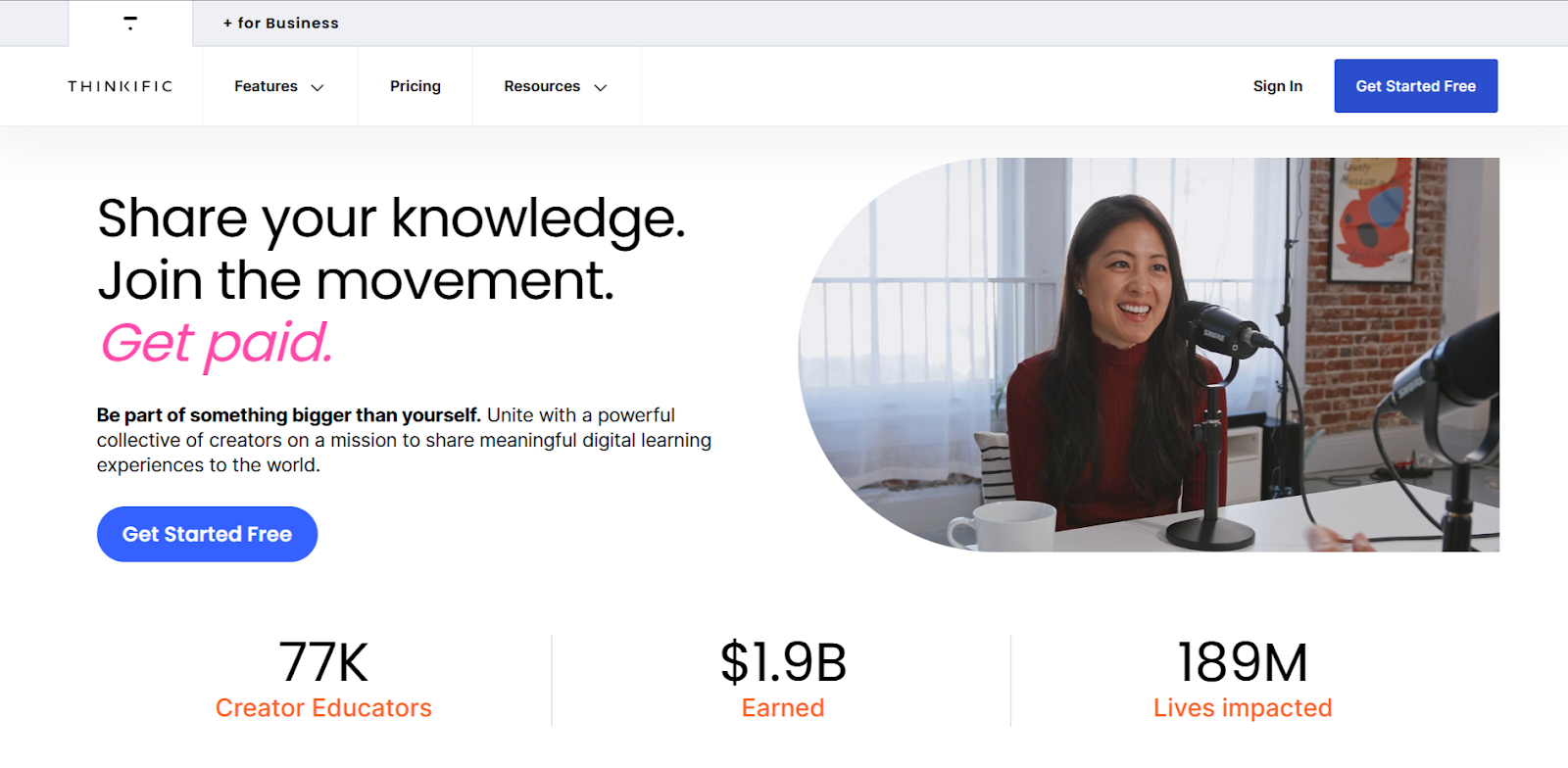
Thinkific is built for creators who want to sell digital products, like courses and memberships, while creating a community. Its focus is on online learning, so the community tools are geared toward course discussion, student engagement, and content sharing. The drag-and-drop website builder makes setting up courses and communities straightforward, even if you’re not super tech-savvy.
- Features: Course creation, membership and community management, drag-and-drop website builder, landing page templates, marketing tools.
- Pricing: Free plan allows one course and one community with two spaces. Basic $36/month, Start $76/month, Grow $149/month.
- Pros: Great for course creators, simple to use, combines community and monetization.
- Cons: Community features are niche and geared toward online learning.
- Best suited for: Educators or creators focused on selling courses and building learning communities.
Thinkific Course Examples to Inspire Your Online Course Journey
5. Circle

Circle has quickly become a popular choice for creators and businesses who want a clean, simple space for community engagement. The platform focuses on connecting members through white-label groups, where you can share content like courses, streams, and posts. Engagement tools like polls, private messages, and threads make it easy to see what your community is into, and monetization is straightforward.
- Features: White-label group creation, digital content sharing, engagement tools, analytics, and easy monetization.
- Pricing: Plans start at approximately $89/month, with a 14-day free trial and no credit card required. Always check Circle’s pricing page for current tiers.
- Pros: Customizable, affordable entry plan, solid all-in-one community features.
- Cons: Advanced plans can get pricey, no live chat support.
- Best suited for: Experienced creators or businesses who want a white-label community option.
Circle.so Review: Is the Online Community Platform Still Worth it?
6. Disciple
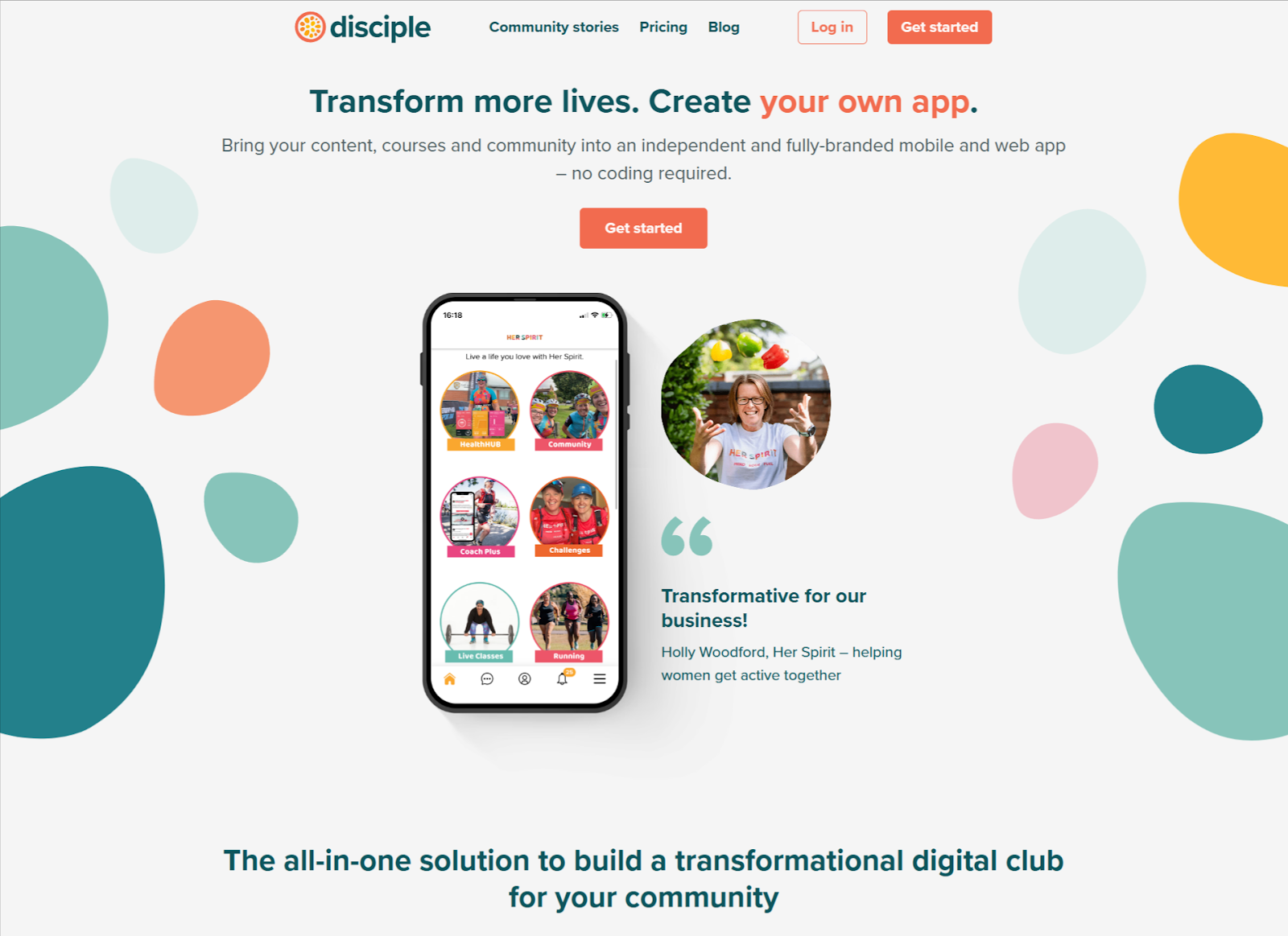
Disciple is a powerful community platform that lets you create a fully branded app for your members, with no coding required. You can customize colors, logos, and integrations, and host content like videos, podcasts, or courses, all in one hub. It’s a strong choice if you want total control over your community experience, though it comes with a higher price tag.
- Features: White-label iOS/Android app, full customization, content library, events and course integrations.
- Pricing: Grow $729/month (annual), Pro $1,167/month (annual), Enterprise custom pricing.
- Pros: Highly customizable, branded app experience, versatile engagement features.
- Cons: Expensive, especially for smaller communities.
- Best suited for: Enterprises or creators looking to take their community to the next level.
Disciple App Review: Pricing, Platform, Pros & Cons
7. Podia
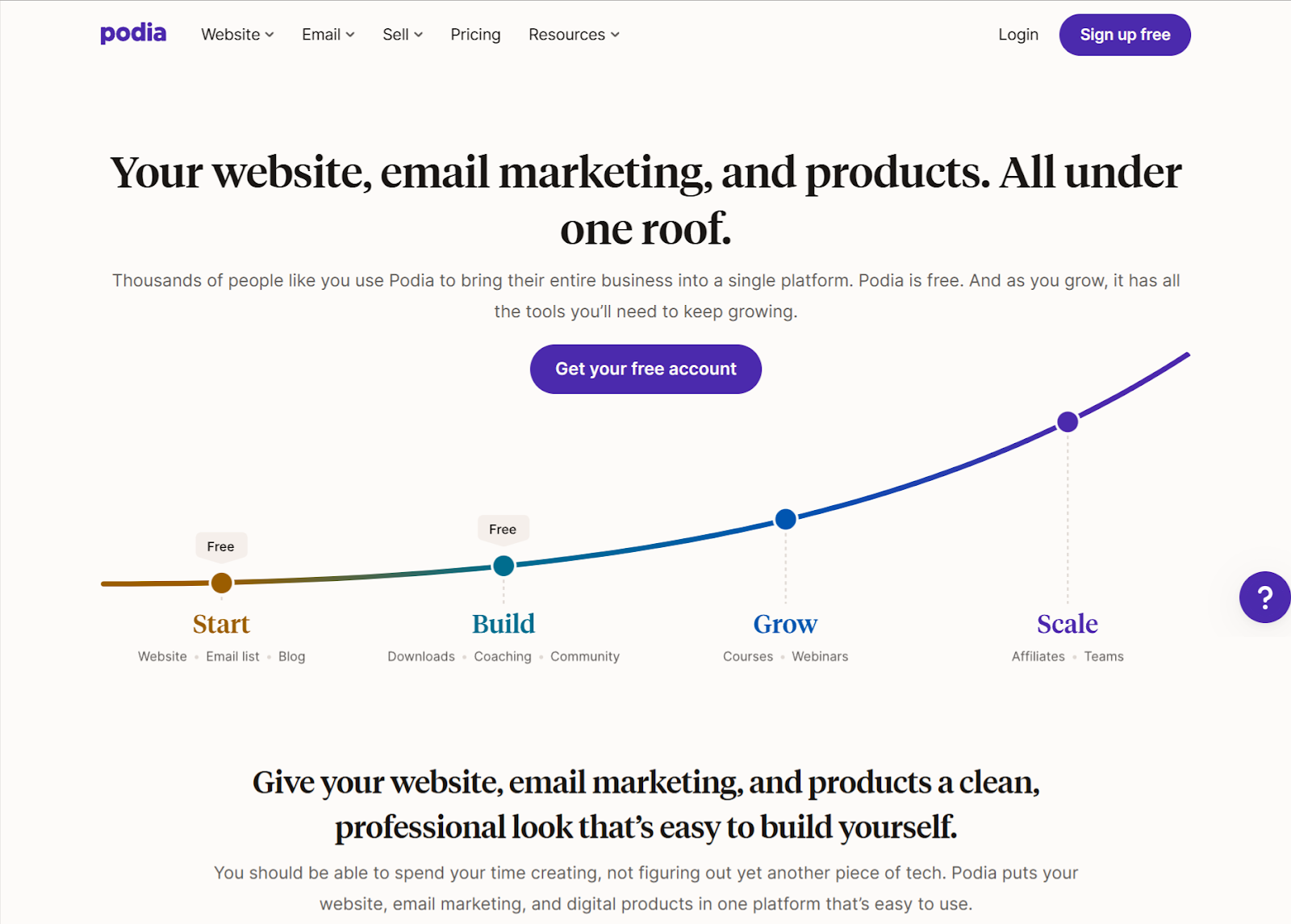
Podia makes it easy to run a community alongside your courses, memberships, and digital products. You can organize discussion threads like forums, group members by topics or tiers, and even monetize access. It’s simple, effective, and beginner-friendly, though it won’t cover every advanced feature some creators might need.
- Features: Private or open communities, forum-style discussion threads, organized by topic or membership, free and paid options.
- Pricing: Free plan for basic website and products, Mover $33/month, Shaker $75/month.
- Pros: Affordable, easy to use, includes free options.
- Cons: Basic feature set, may not suit advanced needs.
- Best suited for: Starting creators, casual users, anyone wanting a simple community setup.
Kajabi vs Podia: Which is Better for Online Course Creators?
8. Kajabi

Kajabi is built for creators who want to sell courses, coaching, subscriptions, and even podcasts, all in one place. You get landing pages, website building, and community tools without juggling third-party apps. It’s solid for managing products and memberships, but less ideal if your primary focus is active community engagement.
It’s a premium option, so expect a higher price tag.
- Features: Sell courses, memberships, and digital content; landing page and website builder; community management built in.
- Pricing: Kickstarter $55/month, Basic $119/month, Growth $159/month, Pro $319/month, Enterprise starts at $10,000/year.
- Pros: All-in-one platform, strong reputation, easy to monetize digital products.
- Cons: Expensive, not the best for active community interaction.
- Best suited for: Experienced creators or businesses looking to sell courses and other digital products.
9. Discord

Discord started as a hub for gamers but has since grown into a versatile community platform for all kinds of creators and groups. You can build your own servers and channels, host voice or text chats, and use bots to automate moderation and community management.
Members can engage in real-time, making it great for discussions, events, or casual hangouts. While Discord doesn’t include native monetization, it works seamlessly with Whop.
Connect your Discord server to Whop to manage paid access, subscriptions, and premium channels for your members without juggling multiple tools. This makes it a strong option for creators who want the communication power of Discord but also want to generate revenue from their community.
- Features: Create servers and channels for specific groups, real-time text and voice chat.
- Pricing: Free for standard use; optional Discord Nitro $9.99/month or $99.99/year for HD streaming, custom emojis, and larger file uploads. Nitro Basic $2.99/month.
- Pros: Completely free to start, excellent real-time communication, highly customizable with bots, and easy to organize multiple communities within one platform.
- Cons: No native monetization without Whop or other tools; large servers can require extra management effort.
- Best suited for: Creators or communities that need strong real-time communication, free-to-join communities, or paid communities managed via Whop.
10. Slack
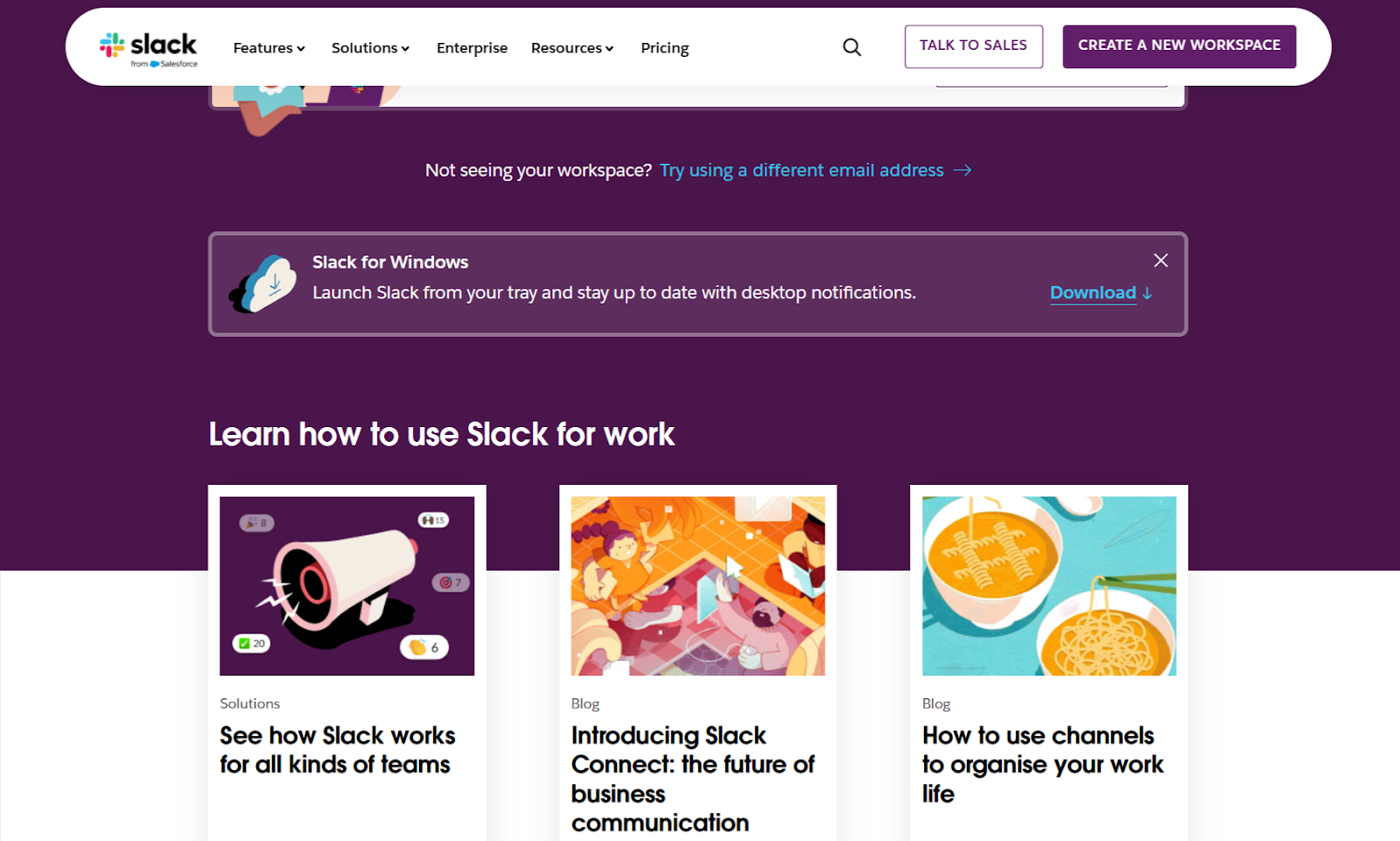
Slack is one of the most well-known platforms for team collaboration, often used in workplaces and for remote teams. While it’s built for professional communication, it also works as a community app for groups that value real-time interaction. You can create channels for conversations of all sizes, host audio or video calls, and integrate bots or APIs to automate tasks and boost engagement.
Slack doesn’t offer as many community-specific features as some other platforms, and analytics or monetization tools are limited. That said, its intuitive interface and reliable chat infrastructure make it a solid choice for smaller or professional-focused communities.
- Features: Chat channels of all sizes, voice and video calls, bot and API integrations for automation, customizable reactions and emojis, and real-time messaging.
- Pricing: Basic plan is free. Pro plan $7.25/month billed yearly per user and includes apps, integrations, message history, and voice-first huddles. Business+ plan $12.50/month billed yearly per user, and adds SSO, data exports, and admin controls. Enterprise Grid pricing is custom.
- Pros: Reliable chat platform, strong real-time communication, easy to set up, API/bot integrations, supports audio and video calls, free tier is functional.
- Cons: Limited community-focused features, costs add up for larger teams or advanced plans, and no built-in monetization.
- Best suited for: Professional or smaller online communities that need strong real-time chat.
What is a community app?
A community app is an online platform that brings people together in one place – fans, customers, co-workers, you get it. It’s a digital hub where members chat, share goals, swap ideas, and stay connected.
Communities work as well for sales coaching as they do for Pokémon card collecting – the point is to curate an environment with limited access, and value inside.
For creators and businesses, the best community apps go way beyond group chats. They help you build and scale communities that grow your brand, boost engagement, and create new revenue streams through memberships or digital products.
Some teams also use them for internal comms to keep projects moving fast – we sure do.
In short: community apps are low-key a must-have for anyone looking to grow online.
How to choose the right community app
Not every community app is built the same. The best choice depends on your goals and your audience.
Just starting and looking to grow sales? Pick a platform that makes it easy to monetize.
Running an established business? You’ll likely need to look for advanced tools, integrations, and analytics.
Building a small group or niche club? Go for something simple, affordable, and user-friendly.
TLDR: The right community app should fit your workflow, your budget, and (most importantly) how your members want to connect.
What features should a community app have?
The best community apps come with a wide range of features, but not all of them are essential for everyone. Before deciding, think about what your community actually needs.
Here are some key features to look out for:
- Integration: Can the app integrate with your existing systems or tech stack? This is especially valuable for workplaces where smooth communication and workflows are critical.
- Customization: Look for apps that allow you to brand your space with logos, colours, and layouts. Customization helps businesses create a professional, on-brand experience for members.
- Cost: Community apps vary in price – some offer free versions with limited features, while others charge for premium tools. Make sure the pricing aligns with your budget and the size of your community.
- Ease of use: A clean, intuitive interface is essential. If your members are tech-savvy, advanced features might work. But for a broader audience, simplicity usually wins.
By focusing on these features, you’ll be able to narrow down the best community app for your goals and your audience.
Want to manage and monetize communities in one place? Welcome to Whop
Building a community online doesn’t have to be messy or overwhelming. The right tools make it simple to bring people together, keep them engaged, and turn your passion (however niche) into profit.
If you want to grow and monetize your community quickly, Whop is the all-in-one solution. Create your hub, add the features you need, and start selling memberships, courses, or digital products — all from one place, with no monthly fees.
As the creator above states:
Choose the right platform to host your community. There's platforms like Skool and Kajabi, but Whop is the number one choice.
Sign up with Whop today and see how easy building a thriving online community can be.



